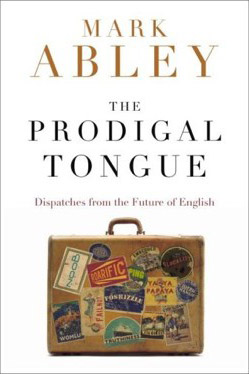The Prodigal Tongue: Dispatches From the Future of English
 Random House of Canada ( 2008)
Random House of Canada ( 2008)
William Heinemann (2008)
Houghton Mifflin Harcourt ( 2008)
“Fascinating.” — Ben McIntyre, The Times
“Well-written … provocative.” — William Safire, New York Times
“Patiently accumulated details are the key to The Prodigal Tongue’s great charm. A survey rather than a thesis, it stylishly covers a large amount of ground, from Lee Kuan Yew to YouTube, via Spike Lee and Ice Cube. ” — Henry Hitchings, Daily Telegraph
“The text of language books such as this is the writing and Abley writes well … Lively … Wise.” — Warren Clements, Literary Review of Canada
“As a poet, journalist, editor, intrepid traveller, scholar and endlessly curious spirit, Abley brings an appropriately eclectic perspective to the subject … Writing as an inquisitive, bemused Everyman, Abley leads us on a lively intellectual journey through uncharted territory, his comfort in the zone of ambiguity making him the ideal travel guide.” — Harold Heft, Montreal Gazette
“Abley approaches his subject like an enthusiastic backpacker. Whether at an art gallery in Kyoto or listening to a Montreal eighth-grader explain the nuances of on-line slang used in the video game World of Warcraft, he’s forever taking notes and meticulously documenting what people say, as well as where, how, and why they say it… This is exactly how most people prefer to have language evolution explained to them: colloquially and with good examples, wit, and style.”
– Michael Hingston, Georgia Straight
“A prodigiously researched investigation … Abley has distilled a vast amount of material into a thoughtful and gracefully written book.”
– George Galt, University Affairs
“Abley looks at the future of English in a poetic, robust, modern way … an excellent guide through this landmine-laden landscape.”
– Mary Ambrose, Canada Post
Random House of Canada offers this description of the book:
“Mark Abley, author of Spoken Here, has created an entertaining and informative exploration of the way that languages –English, Japanese, French, Arabic and other major tongues — are likely to transform and be transformed by their speakers during the 21st century. Grammar and vocabulary are just the beginning; more importantly, this book is about people.
“In places like Los Angeles, Tokyo, Singapore and Oxford, Abley encounters hip-hop performers and dictionary makers, bloggers and translators, novelists and therapists. He talks to a married couple who were passionately corresponding online before they met in “meatspace.” And he listens to teenagers, puzzling out the words they coin in chatrooms and virtual worlds. Everywhere he goes, he asks what the future is likely to hold for the ways we communicate.
“Abley balances a traditional concern for honesty and accuracy in language with an untraditional delight in newly minted expressions. Lively, evocative, passionate and playful, this is a book for everyone who cherishes the words we use.”
An excerpt from The Prodigal Tongue:
On a bright October afternoon, I was standing in front of a class of 16- and 17-year-olds in a small town west of Montreal. Their English teacher had invited me to give a writing workshop in the high school library. The hour was nearing its end when abruptly I switched course. Instead of talking about metaphors and similes, sweet conclusions and dynamite beginnings, I asked each student to jot down a few words or phrases that older people would not understand, and then provide a brief definition for each term. I gave the class no advance warning. The risk was that this impromptu assignment would induce a yawn-filled silence, a retreat into heavy-lidded boredom. But instead, the students — especially the girls, I noticed — set about the task with enthusiasm.
“You mean any words?” said a preppy-looking girl in blue. “Even the ones that aren’t in the dictionary?”
“Especially the ones that aren’t in a dictionary,” I replied.
I waited a couple of minutes — time was short — and asked for the results. Arms filled the air. Hands waggled. I’m a reader, a parent, a viewer, a listener; I thought that all together, the students might come up with a dozen words I didn’t know. So much for the vanity of age.
Cheddar, said the first, meaning “money, lavish earnings.” (I’ll give this and all the other definitions in the students’ exact words.) He got owned, said another: “rejected, shut down, beat up.” On the go, added a third: “it’s like going out, but not official.” I recognized some of the expressions, of course; even a senior citizen of fifty can comprehend eye candy and loaded, poser and flame. Did these innocent, cool teenagers really believe their generation had invented high?
But as I stood there in the sun-dappled library, I realized that the majority of the students’ words and phrases left me bemused. What on earth was burninate? Was d-low somehow related to “below,” “delay,” “J. Lo.” — or to none of those terms? (Not wanting to keep the meanings secret — to d-low them, that is — I’ll suggest that you’d burninate something only if you had the fire-breathing powers of a dragon.) More generally, by what learned or instinctive command had these young people enacted their self-assured takeover of the language?
